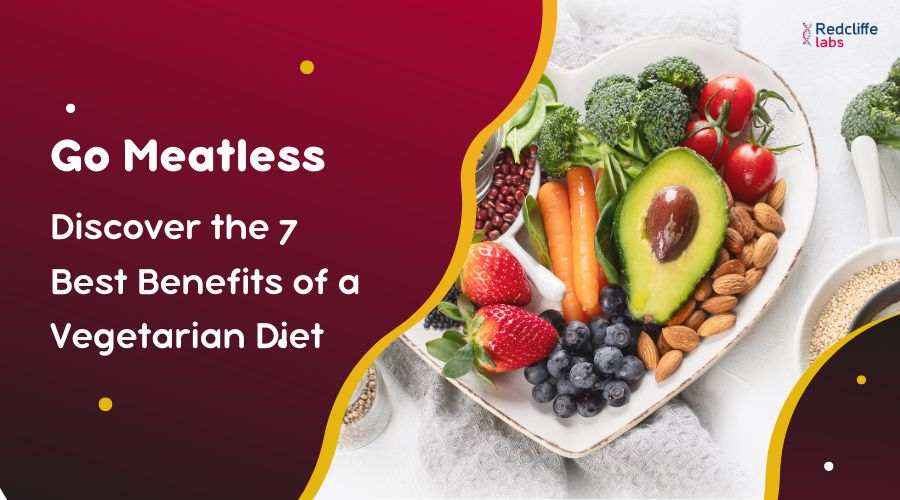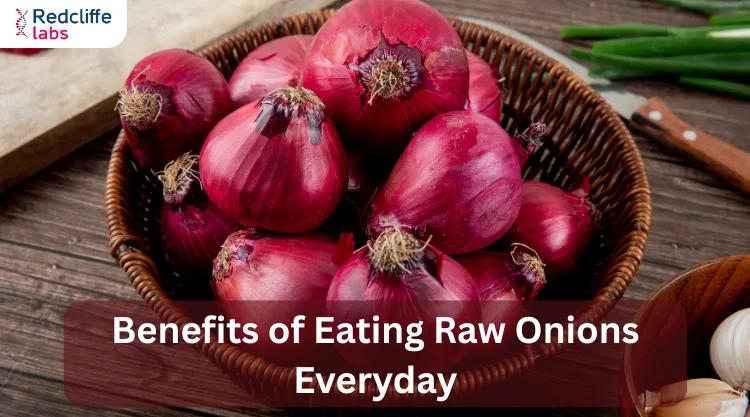Go Meatless: Discover the 7 Best Benefits of a Vegetarian Diet

Medically Reviewed By
Dr. Ragiinii Sharma
Written By Sheena Mehta
on Aug 12, 2024
Last Edit Made By Sheena Mehta
on Jul 19, 2025

Introduction
Health experts and people in general often discuss whether vegetarians get enough protein. Protein deficiency is a growing concern in India among those who live a vegetarian lifestyle. Both nutrients and proteins are important for human health, and if any of them are deficient, it will adversely affect optimal body function.
The vegetarian diet’s popularity is increasing daily. People choose plant-based foods over animal products because they do not want to harm them. Besides, a plant-based diet is rich in fiber, vitamins, and other nutrients and emphasizes fruits, vegetables, grains, lentils, nuts, and beans. Nonetheless, people who don’t eat consume fewer calories and less fat, which helps them maintain their body weight.
Also read:
https://redcliffelabs.com/myhealth/food-and-nutrition/best-protein-rich-food-for-vegetarians/
How many types of vegetarians exist? And which one are you?
Before we delve into the different types of vegetarians and what they eat, Let’s understand the concept of vegetarianism. Vegetarianism is the practice of not eating meat or the flesh of any other animal. It may also include eliminating the consumption of all by-products of animal slaughter. Individuals who practice vegetarianism are called vegetarians.
Types of vegetarianism
There are many types of vegetarians, and their diets include vegan, lacto-vegetarian, lacto-ovo vegetarian, and ovo vegetarian.
- Lacto-ovo vegetarians: This category of vegetarians does not eat meat or seafood. However, they consume milk, eggs, and plant foods.
- Lacto-vegetarians do not eat meat, eggs, or seafood. However, they include plant foods and dairy foods in their diet.
- Ovo-vegetarian: This category of vegetarians skips meat, dairy foods, and seafood, but they do include plant foods and eggs.
- Flexitarians follow a flexible vegetarian eating pattern, where the intake is mostly vegetarian, but they do eat meat, fish, chicken, or any animal product when craving it.
- Pescatarian: A pescetarian eats fish, eggs, and dairy to get extra protein in their diet.
- Vegans avoid all animal and animal products and only eat plant foods.
- A raw vegan is a strict form of vegetarianism. Its diet includes unprocessed, raw plant foods that have not been heated above 104–120 °F.
No matter the type, vegetarian diets all focus on plant-based foods, including fruits, grains, and veggies.
When we talk about vegetarianism, the biggest question that is making headlines is, “How can vegetarians get enough protein?”
Plants are rich in protein.
Plants are rich in protein by nature. Their composition consists of structured cells, enzymes, and hormones. You may be amazed that plants are so rich in protein that they easily cater to the needs of elephants, giraffes, gorillas, and other of the largest animals on earth. Hence, it is also clear that if these giant animals can get adequate nutrition in the form of proteins from plants, so can we.
Further, leading health organizations such as the American Heart Association, the American Cancer Society, the American Institute for Cancer Research, and many others underscore that animal proteins have detrimental health hazards compared to plant-based proteins. Besides, eating a plant-based, meatless meal contributes to better health and improved well-being.
Here is a comprehensive chart of 10 plant-based protein sources.
|
Food |
Amount |
Protein (Grams) |
|
Tempeh |
1 cup |
41 |
|
Seitan (seasoned wheat gluten) |
3 ounces |
31 |
|
Cooked soybeans |
1 cup |
29 |
|
Cooked lentils |
1 cup |
18 |
|
Black beans, cooked |
1 cup |
15 |
|
Kidney beans, cooked |
1 cup |
13 |
|
Cooked chickpeas |
1 cup |
12 |
|
Tofu, Firm |
4 ounces |
11 |
|
Peas, cooked |
1 cup |
9 |
|
Whole wheat bread |
2 slices |
5 |
Plant-based proteins: a healthier choice
“The vegetarian diet is for anyone who wants to be healthier, especially for their heart,” says Glick.
Plant-based foods are healthier because they are accompanied by fiber and other food components. Plant proteins have zero cholesterol. They tend to be low in fat. Dairy products that are not plant-based contain protein and can be incorporated into a balanced vegetarian diet when eaten in moderation. Veggie meats also contain protein and can be added to your daily diet.
There are many reasons to follow a vegetarian or plant-based diet, including environmental, health, religious, or ethical.
It is linked to several health benefits regarding nutrients, a lower chance of health problems, and weight loss.

The Top 7 Health Benefits of a Vegetarian Diet
Studies suggest eating more plant-based foods and less meat can make you healthier. They contain all the essential nutrients that cater to individual needs. A well-balanced, plant-based diet can work for you and your lifestyle if carefully planned. Some of their health benefits include:
- Reduces cholesterol levels: Compared to meat-based diets, vegetarian diets typically contain reduced saturated fats, total fats, and cholesterol. Thus, they shield against diseases like cancer, cataracts, and diabetes.
- Improves your heart condition: Plant-based or vegetarian diets reduce your consumption of saturated fats, thus beneficial for your heart health.
- Boiling plant-based foods such as turnip greens, broccoli, and green peas guarantees high amounts of fiber. This will improve your gut health and give you a better and longer life span.
- Helps you reduce weight: Plant-based foods keep you fuller longer, making it easier to eat less and, thus, allowing you to control your weight.
- Reduces Depression: Research suggests vegetarians experience more happiness than their non-vegetarian counterparts. The freshness of many vegetarian foods may positively impact mental well-being.
- Reduces Carbon Emissions: Animals release greenhouse gasses, contributing to a larger carbon footprint. On the other hand, a vegetarian diet or plant-based diet not only reduces our carbon footprint but is also helpful in conserving precious resources like water.
- Least likely to cause foodborne illnesses: Meat, poultry, and seafood are most likely to be contaminated and thus spot the limelight when it comes to foodborne illnesses. While a plant-based diet doesn’t completely protect against food-related woes, it can reduce the risk significantly.
A vegetarian diet or plant-based eating could help boost overall health and reduce health-related complications by sticking to proper portions and nutrient levels.

Conclusion:
Proteins are building blocks for the body, supporting the building of muscles, tissues, and cells. Vegetarians or those who want to try vegetarian food must be mindful of their intake, as their primary protein sources are whole fruits and vegetables, lentils, and dairy products. Nevertheless, Alpino’s peanut butter is a highly beneficial product for a vegetarian or vegan diet. All three variants of Alpino, crunchy honey nut spread, chocolate flavor spread, and classic creamy spread, can provide up to 6 g of protein per serving while still enjoying a delicious snack!
Frequently Asked Questions (FAQs):
How much protein is recommended for adults?
The recommended dietary allowance (RDA) for proteins for adults is 0.8 grams per kilogram of weight.
What is the most potent source of protein for vegetarians?
The most potent sources of protein for vegetarians are:
- Beans and legumes
- Soy
- Nuts and nut butter
- Whole Grains
What are the symptoms of protein deficiency in vegetarians?
The symptoms of protein deficiency in vegetarians are:
- Hair loss or thinning
- Lowered muscle mass or weak muscles
- Gradual weight loss
- Dry Skin
- Feeling of fatigue
List three health benefits of plant-based foods.
The health benefits of plant-based protein-rich foods are:
- Reduces or lowers the risk of developing diabetes, heart disease, and cancer.
- They contain antioxidants, vitamins, and minerals, thereby benefiting overall health.
- Protein-rich plant-based foods give you a feeling of fullness, contributing to weight management.



